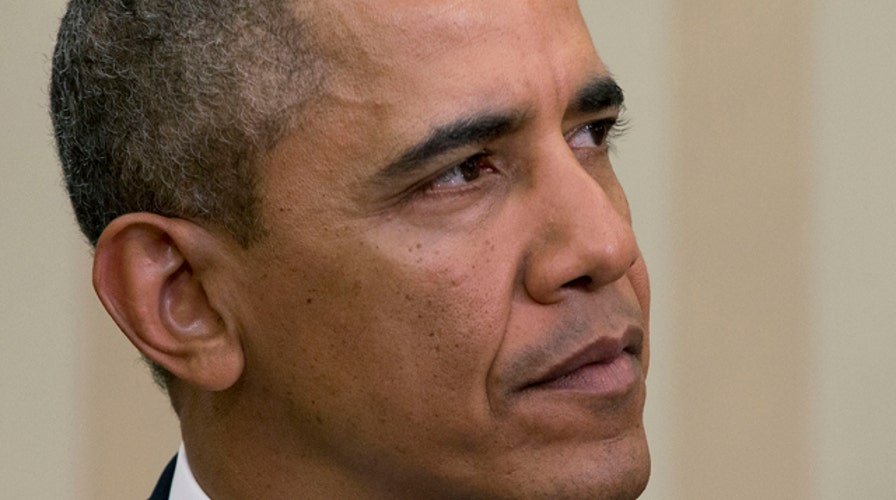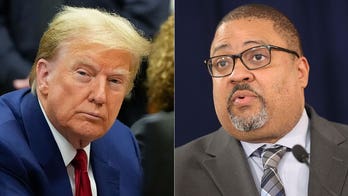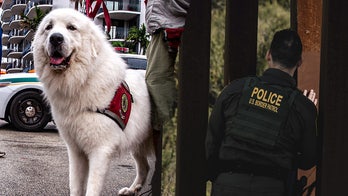Also...
Karzai’s Ingratitude
Fallout Over Ukraine: The Chattering Classes Blame Obama
The pundits and prognosticators are hammering President Obama over Ukraine, although most get around to admitting that American options in this crisis are quite limited.
Even Obama’s most hawkish critics aren’t arguing that we should send U.S. troops to Russia’s doorstep to try to rescue Crimea, an area of 2 million people, from the Kremlin’s invasion. So the debate swirls around the wielding of economic and diplomatic sanctions.
Plenty of people on TV have suddenly reconstituted themselves as Ukraine experts, while a relative few correspondents have been reporting from Kiev and Crimea, a byproduct of the shrinkage of western news bureaus around the world. It also reflects a cold-hearted calculation that war-weary Americans aren’t much interested in foreign news unless U.S. troops are involved. (Anchors started parachuting into the country yesterday, including Fox's Shepard Smith and CNN's Anderson Cooper.)
Still, the popular revolt that ousted Ukraine’s pro-Russia president, while certainly covered, wasn’t the dominant story it would have been during the Cold War.
But there are Cold War echoes in the coverage of Vladimir Putin. A rough consensus has emerged that he is willing to pay almost any price—and obliterate whatever benefit he gained from the Sochi Olympics—to expand Russia’s sphere of influence in the former Soviet republics. Putin is perfectly willing to flout international law to prevent a pro-western regime from taking power in Ukraine, and the safety of ethnic Russians in Crimea, in this view, provided the flimsy pretext he needed.
The question is whether this is a limited excursion, or more like Hungary in 1956 and Czechoslovakia in 1968.
Grappling with the geopolitical realities—for example, that Crimeans cannot survive without water from Ukraine, which in turn is dependent on Russia for natural gas—is complicated. So the media tend to default to the easier debate: Is Obama to blame or not?
On that score, the president is hardly winning plaudits, despite John Kerry’s tough talk on “Meet the Press” about possibly kicking Russia out of the G-8 and other forms of retaliation.
The Washington Post editorial page, which backed the Iraq war and is more hawkish than many realize, says Obama’s foreign policy is “based on fantasy”:
“For five years, President Obama has led a foreign policy based more on how he thinks the world should operate than on reality…
“He’s also in part responsible for the national mood: If a president doesn’t make the case for global engagement, no one else effectively can.”
Post columnist David Ignatius defends the president:
“Perhaps inevitably, given Washington’s political monomania, the big subject over the weekend wasn’t Putin’s criminal attack on Crimea but whether Obama had encouraged it by being insufficiently muscular. There are many valid criticisms to be made of Obama’s foreign policy, especially in Syria, but the notion that Putin’s attack is somehow the United States’ fault is perverse.
“For two months the Obama administration has been prodding the European Union to take the Ukraine crisis more seriously.”
At National Review, John Fund spreads the blame:
“Barack Obama is the second U.S. president in a row to badly misjudge Vladimir Putin. In 2001, after his first meeting with Putin, George W. Bush famously toldColin Powell, his secretary of state, that he thought the Russian leader was religious. ‘Powell, I looked into Putin’s eyes and I saw his soul.’ To which Powell replied: ‘Mr. President, I looked into President Putin’s eyes and I saw the KGB.’
“Barack Obama hasn’t made that mistake. But in the wake of Russia’s invasion of the Ukranian region of Crimea, it’s worth remembering that in 2008, Obama ridiculed John McCain for warning about Russia after its invasion of independent Georgia. In 2012, he mocked Romney for identifying Russia as our top geopolitical foe, sneering, ‘The Cold War has been over for 20 years.’”
The thing is, we have cooperated with Russia on some fronts—most notably, the Putin-brokered deal for Syria to give up its chemical weapons. Such cooperation is now likely to go into deep freeze.
Obama and Hillary Clinton are also drawing flak for attempting to turn the page with Russia when they took office (and it will be fascinating to see whether Hillary speaks out on this):
“Mr. Obama and the West must act, rather than merely threaten, because it's clear Mr. Putin believes the American President's words can't be taken seriously,” says the Wall Street Journal editorial page. “After the 2008 invasion of Georgia, President Obama pretended the problem was Dick Cheney and tried to ‘reset’ relations with Moscow. Mr. Putin has defied the civilized world on Syria and Mr. Obama rewarded him by making Russia a partner in phony peace talks. Mr. Putin gave NSA leaker Edward Snowden asylum over U.S. objections, and he got away with that too.
“In the brutal world of global power politics, Ukraine is in particular a casualty of Mr. Obama's failure to enforce his ‘red line’ on Syria. When the leader of the world's only superpower issues a military ultimatum and then blinks, others notice.”
Though it’s worth noting that Obama’s wobble on Syria came as Congress was demanding that he get Hill approval for military intervention there—and it was pretty clear the votes weren’t there.
Meanwhile, as the U.S. contemplates a crackdown on trade deals and visas, the Russians have struck back:
“Russia’s state-controlled network Channel One has cancelled its live coverage of the Oscars in order to cover the crisis in Ukraine.”
Karzai’s Ingratitude
This Hamid Karzai interview with the Washington Post is infuriating.
“Afghans died in a war that’s not ours,” the Afghan president said. He described Al Qaeda as “more a myth than a reality” and the majority of U.S. prisoners in the country are innocent. Karzai also believes the war was “for the U.S. security and for the Western interest.”
Where do we start?
Karzai would not be president if the United States had not liberated his country from Taliban control.
To say the war is “not ours” is an insult to all the Americans who fought, and in some cases died, to prop up his regime over the last dozen years.
Whatever the strength of Al Qaeda now, it certainly wasn’t a myth when Usama bin Laden was using Afghanistan as his base to plan 9/11.
I know Karzai has to play to domestic constituencies in blaming the U.S. for civilian casualties as most of the American forces prepare to exit. But this was his war every bit as much as ours.
Top Twitter Talk
Washington Post: Obama's foreign policy based on fantasy





